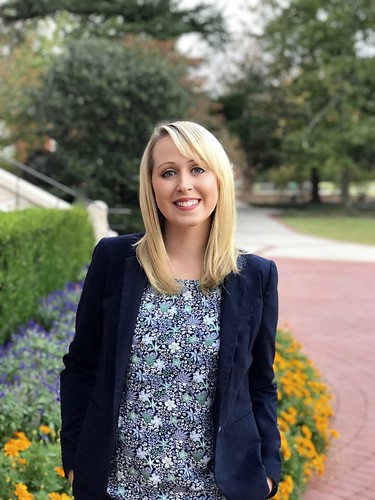Auburn pharmacy doctoral student is first to earn R36 grant
Article body
Tessa Hastings is the first Auburn University student to be awarded a highly competitive research grant from the Agency for Healthcare Research and Quality, a division of the U.S. Department of Health and Human Services.
A doctoral student in Auburn’s Harrison School of Pharmacy, Hastings is researching how Alabama pharmacies can share vaccine information with each other so they know how many residents are actually receiving vaccines and how to educate and remind the public to re-vaccinate.
“Oftentimes, effective interventions are not adopted or implemented properly,” she said. “My research goal is to improve health care safety and effectiveness through the adoption of innovations in real-world organizations.”
The Agency for Healthcare Research and Quality Grants for Health Services Research Dissertation Program, or R36, supports dissertation research that addresses the agency’s mission, which is to produce evidence to make health care safer, higher quality, more accessible, equitable and affordable, and to work with HHS and other partners to make sure that the evidence is understood and used.
Only 18 graduate students earned an R36 this year.
Hastings receives a $42,424 award to support her dissertation research: “Assessing Barriers and Increasing Use of Immunization Registries in Pharmacies: A Randomized Controlled Trial.” The first phase of her study involves identifying barriers in utilization of immunization registries within a pharmacy context.
“Pharmacists are instrumental in improving adult immunization rates. However, with the role of pharmacists as vaccination providers expanding, documentation is key to maintaining complete and accurate immunization records,” she said. “It is critical that each provider administering vaccines, including pharmacists, participate and update the registry each time a vaccine is administered to a patient. Many states, including Alabama, have limited pharmacy participation in the registry.”
During the second phase, Hastings will tailor the acquired information into a registry training program with strategies specific to individual subsets of pharmacies.
“If successful, this will help to improve the completeness and accuracy of the Alabama immunization registry, providing the potential for pharmacists to use it consistently in assessing immunization status and recommending additional vaccines, thereby improving patient safety and vaccination coverage,” she said.
Hastings has received a number of competitive awards including a PhRMA Foundation pre-doctoral fellowship. The PhRMA Foundation supports young scientists in disciplines important to the pharmaceutical industry by awarding them competitive research fellowships and grants.
Hastings works under the supervision of her advisor Salisa Westrick, Sterling Professor and head of the Department of Health Outcomes Research and Policy in Auburn’s pharmacy school. She first began working with Westrick as a research assistant when she joined the doctoral program in 2015 and has worked with her on multiple projects.
“The mentorship and guidance I’ve received from Dr. Westrick has been invaluable,” said Hastings.
Before joining the Harrison School of Pharmacy, Hastings received her Bachelor of Science in Pharmaceutical Sciences, Pharmacy Administration from the University of Toledo. It was during this time that she became interested in research and decided to pursue her master’s degree in Health Outcomes and Socioeconomic Sciences.
“My career goal and objective has always been to obtain an academic pharmacy position,” said Hastings.
When she began exploring doctoral programs, Hastings said she looked for an experience that prioritized rigorous training in methods and theory, while also providing flexibility to tailor courses to suit her interests.
“The doctoral program in Health Outcomes Research and Policy at Auburn sounded like a perfect fit,” said Hastings. “I was impressed by the friendly atmosphere and the availability of the faculty members. Whether you need to discuss courses, your dissertation or career advice, the department faculty are incredibly generous with their time. The entire pharmacy school is a perfect example of the Auburn Family.”
Hastings and Westrick will also be working with individuals from the Alabama Department of Public Health, including Immunization Division Director Cindy Lesinger, registry branch director Bonnie Davis and Disease Intervention Specialist Calvin Gipson. The research team also includes Hastings’s dissertation committee members from the pharmacy school: Jingjing Qian, Brent Fox, David Ha and Joni Laken.
“These individuals have been instrumental in my success with this R36 grant,” said Hastings.
Related Media
Media interested in this story can contact Communications Director Preston Sparks at (334) 844-9999 or preston.sparks@auburn.edu.
Auburn University's Harrison College of Pharmacy is ranked among the top 20 percent of all pharmacy schools in the United States, according to U.S. News & World Report. Fully accredited by the Accreditation Council for Pharmacy Education (ACPE), the School offers doctoral degrees in pharmacy (Pharm.D.) and pharmaceutical sciences (Ph.D.) while also offering a master's in pharmaceutical sciences. For more information about the School, please call 334.844.8348 or visit the Harrison College of Pharmacy website.





